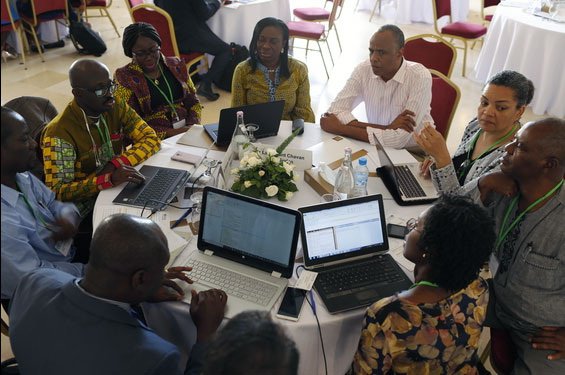 Public health experts review and update their national Pandemic Influenza Preparedness Plan
Public health experts review and update their national Pandemic Influenza Preparedness Plan
Photo: Simon van Woerden/WHO
13 August 2018 - Today, in the centennial anniversary year of the Spanish flu pandemic which killed over fifty million people in 1918, public health experts from five countries are gathering in Tunis for a three-day workshop, to develop a planning tool for creating or updating national plans for pandemic influenza. This is the first time two WHO Regional Offices (the Office for the Eastern Mediterranean Region, or EMRO, and the one for the African Region, or AFRO) have organized such a workshop on a key health issue.
In the workshop, Ministry of Health staff from Morocco, Tunisia, Oman, Tanzania and Ghana joined experts from WHO to develop an action planning tool, which allows countries to identify gaps in their National Pandemic Influenza Preparedness Plans. The tool is being developed in accordance with the Pandemic Influenza Preparedness checklist and other WHO guidance for national pandemic influenza preparedness plans.
Pandemic influenza, which occurs when a previously unknown type of influenza attains global spread, is as rare as it can be deadly. The last influenza pandemic, of H1N1 influenza or pig flu, occurred in 2009, after a long period without pandemics since the Russian flu of 1977. To fight these threats, WHO helps countries around the world with preparation. One of these preparation measures are regular updates to the Pandemic Influenza Preparedness Plans, in keeping with the latest scientific evidence and best practices.
Dr Mamunur Malik, head of the Infectious Hazards Management unit in WHO’s Eastern Mediterranean Region, said: “The teams present here today will come away with a roadmap to update their pandemic influenza preparedness plans. Once they return to their countries, this will result in operationalizing their plan and ultimately, a stronger preparedness and readiness state in the Region for the next flu pandemic.”
As part of WHO EMRO’s work supporting influenza and pandemic influenza preparedness in 2017, more countries in the Eastern Mediterranean Region shared virus samples for testing and diagnostics, and more countries reported regular influenza data through WHO’s platforms such as EMFLU, FluNet, and FluID. At the end of the workshop in Tunisia, the roadmaps for updating participating countries’ Pandemic Influenza Preparedness Plans can be added to this list. Because, as WHO virologist Dr Belinda Herring said: “The next pandemic could be around the corner.”


